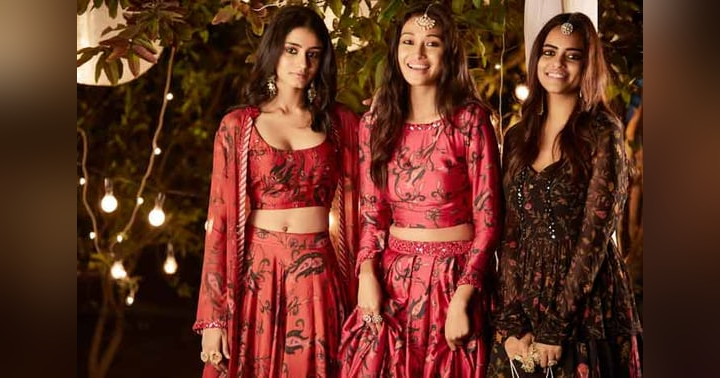The Power of Authenticity: Divya Soneji's Mission

Today's chaiversation is about one woman's mission to share the truth turned into a 40-thousand-strong following. From gender inclusivity, fighting the patriarchy, breaking stigma, supporting marginalized voices, and curating South Asian content beyond the ordinary, Divya Soneji, Founder of South Asian Nation on Instagram, has made it her life mantra, to be unapologetically herself and use her platform and voice for the greater good.
Here's an excerpt from our interview.
On growing up in India and her early influences in her life and how that shaped who she has become today — brave, bold and unapologetic.
Divya - I grew up in a very small town then, a big town now, Gurgaon which is very close to Delhi. Talking about how I am the way I am now it's definitely shaped by my circumstances, because there was a time when my father wasn't working and my mother had to work overtime to make money for the family and you put food on the table, pay for our school and the rent, and I remember she was making Rs.500 every month (it equates to $19) And we were making it work. I think when my parents were away working and we would come back from school we just had to take care of ourselves but I think we learnt how to live the life and you know navigate around circumstances and challenges. For example, when it rained a lot and our house which was literally below the street level, would be flooded with water off the gutter and garbage, and me and my brother would just like to swim in it and clean the whole house out.
Luckily when my father found his standing in life later on and we started to make decent living. He decided to sent me to Delhi for college, which is not a big deal for a lot of people but for me it was a big town and I was used to be from Gurgaon where nothing was developed at the time in 2003. I remember my father took me to a bus station and he showed me a bus and said this is the bus you're going to take 7 o'clock in the morning and then you're going to figure out which bus you're going to take back home. My college was full of rich kids and I was the only kid who was traveling by public transport. Everyone else came in chauffeur driven cars, while I used to walk miles to reach college from the bus stop, so it was definitely an interesting journey.
Life took a different kind of turn once I moved here to the USA, immediately after I moved I I had a really bad allergic reaction to ibuprofen and I was get a bedridden for like six months and it happened to be from September to March which is the beginning of fall/winter snow season in Chicago and I wasn't able to walk, I was unable to wear shoes because I had blisters on my feet. During this time I had a lot of time to retrospect about my life and what I want to do.
I always wanted to start something that would inspire people, specifically South Asians. The one issue I faced was whoever I spoke to and whoever I came across in the US from a South Asian background or Indian-Americans who are born here AKA. first generation Indian-American kids in the diaspora is that they love the culture but they don't know the problems, and I'm not talking about familial issues that are of course a given in our culture but the more the grassroots problems that happens back in our homeland. By this, I just didn't want to cover India I wanted to cover the whole South Asia because we have the same story, similar values, similar socio-political issues, so I wanted to bridge that gap and raise awareness of awareness and start conversations about caste, colorism, mental health stigmas, and women's health and so much more.
So, that was the reason I wanted to start South Asian Nation.
Shwetha: I vividly remember the early days when I actually discovered you and then South Asian nation on Instagram, I've learned a big deal a very big deal about many different things, especially around the nuances of casteism and I think in the kind of bubble that I grew up in, I didn't give importance to caste but then when you are from you know a lower caste and you do have those "other" experiences you know it is very important to speak out and then becomes more important for people like us to educate ourselves about it. You've done such a wonderful job in bringing those unheard voices and given them a platform to share their side of the story, so kudos to you for that.
On the drivers that pushed her to turn her experience into a passion with purpose and give it a voice and platform - South Asian Nation
Divya: I will start with caste because that is something I've never said publicly. When I was growing up, I was a kid who wanted to fit in because I knew I was talented, I knew I could make friends but in my town, people would ask your caste before they would ask your name. For example, they would be like, oh so which caste are you, is it Kshatriya or is it that, so I started lying about my caste. I started telling them all that my name was Divya Varma. I never wanted to share about my caste because they would not let me be friends with them, they wouldn't let me be in their group and even though I had a lot of issues in my life, I knew I was a cool kid, haha!
Sad but true, I was "fortunate" that I was a bit light-skinned because people usually have this misconception that people in backward castes or lower caste have darker skin and they live in a certain area and although our home was very small and nothing fancy, we lived in a neighborhood where they were Punjabis and Sikh people.
Gosh, I cannot imagine having to think about all of that at such a young age when you're still figuring out what this whole world is all about and to get into those you know nitty-gritty nuances of caste must have been so hard.
Shwetha, Founder & Host, Chai Break Podcast
Divya: True, that is when I started talking about my past and my true identity and it's because of my father. After I went off to college my father was very involved in our community service so he actually built a temple for the people of my community so that they can go to the temple and they would not be kicked out. He led the way and because of him I learned that I'm not gonna hide my identity. So when I came to the US that's what I realize that this is my time I am at a place where I see casteism creeping in families but here I am trying to hide it from the world but now is the time that I am going to tell the world that I am from backward caste and this is my reality and this is how I grew up.
Part of my identity was and is my physical being, my body. I had to face a lot of fat-phobic comments within my marriage about how I don't do any portion control and have no self-control when it comes to eating, this was something I'd never heard in my life. This had a big impact even on someone very confident like me, my confidence came crashing down. After a lot of struggle and demeaning comments about my weight, how I won't get the type of jobs I want etc, I was determined to change my destiny.
Divya Soneji, Founder, South Asian Nation
On her career trajectory and how she worked her way up, from her first job that paid her a mere $8/hour to now hitting that six figure mark, a huge milestone that deserves to be celebrated.
Divya: I knew I was talented and knew I will get a job in my industry, digital marketing. I would be up at seven in the morning until 5 o'clock each evening I would just apply for jobs, until I finally one as a digital marketing manager.
Divorce is still a big taboo in a society and this is something we really really need to acknowledge and credit women like Divya everywhere who are bold enough because the amount of courage it takes to actually get out of a marriage relationship that is not working is commendable
Shwetha, Founder & Host, Chai Break Podcast
I don't think men have that wired in their head that a woman can literally move countries and mountains for you and you will never realize it. I did it, and I tried to make it work for seven years, which is not a small amount of time, when each day comes with its own set of challenges.
I have never lived alone in my life before this and now that I'm by myself, I believe this is my time. I have my two cats who keep me sane, I have beautiful friends who keep a check on me but I could not describe how I feel right now that this is beyond words.
You chose yourself, which is the highest form of self love even though to some choosing yourself can come across as selfish.
Whether it's a spouse relationship or even a friendship, if you have ifs and buts and conditions to love a person, then you're not letting the person be themselves. That's when I just felt like the doors were closing and I moved out.
When I announced it on social media that I'm finally formally physically moved out you won't believe how many women reached out to me, women who were already going through a divorce. Some of them are my childhood friends and others who I work/worked with, no one knew their stories, since what they share is happy moments with their kids etc. The one resounding response I got from across the board was that they are happy getting out of marriage/relationship.
Divya Soneji, Founder, South Asian Nation
What is your advice or your 101 for women and especially immigrant women everywhere to help them navigate huge life changes, like moving to another country like many of us do/have done:
- It's very important to sit with yourself and try to retrospect on life because your life has changed you've made a big move and with that comes a whole set of new experiences and through this you're learning a lot of new things about yourself.
- Find things to do in your city to keep you busy, whether it's a hobby class, a meetup group etc. This will help you meet women from different backgrounds and build your network.
- Reach out to people for help, that's how I found my passion by putting myself out there with everything that I had and everything that I was. That's how I started my personal blog and eventually South Asian Nation.
- Create your own identity, don't try to blend in, stand out and take pride in who you are.
To listen to the full episode, click here.
Let us know your thoughts in the comment section.







